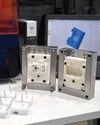
Mahindra & Mahindra Limited and Ford Motor Company have signed a definitive agreement to create a joint venture that will develop, market and distribute Ford brand vehicles in India and Ford brand and Mahindra brand vehicles in high-growth emerging markets around the world.
Mahindra and Ford will form a joint venture, with Mahindra owning a 51 percent controlling stake and Ford owning a 49 percent stake. Ford will transfer its India operations to the joint venture, including its personnel and assembly plants in Chennai and Sanand. Ford will retain the Ford engine plant operations in Sanand as well as the Global Business Services unit, Ford Credit and Ford Smart Mobility.
The joint venture is the next step in the strategic alliance forged between Ford and Mahindra in September 2017 and is expected to be operational by mid-2020, subject to regulatory approvals. The joint venture will be operationally managed by Mahindra, and its governance will be equally composed of representatives of Mahindra and Ford. The joint venture will be responsible for growing the Ford brand in India and exporting its products to Ford entities globally. Ford will continue to own the Ford brand, and its branded vehicles will be distributed through the current Ford India dealer network. Mahindra will continue to own the Mahindra brand and operate its own independent dealer network in India.
This story is from the October - November 2019 edition of ET Polymers.
Start your 7-day Magzter GOLD free trial to access thousands of curated premium stories, and 9,000+ magazines and newspapers.
Already a subscriber ? Sign In
This story is from the October - November 2019 edition of ET Polymers.
Start your 7-day Magzter GOLD free trial to access thousands of curated premium stories, and 9,000+ magazines and newspapers.
Already a subscriber? Sign In

The Changing Face Of Mobility
A brief look at the salient points on how plastics is transforming automotive manufacturing

Nippon Launches Weatherbond PRO
Nippon Paint (India) Private Limited (Decorative Division) Asia’s leading paint manufacturer launched the advertising campaign for Weatherbond PRO – the high durable exterior emulsion offering up to 15 years of protection against extreme climate conditions like prolonged exposure to heat, and heavy spells of rain. Based on extensive research done by Nippon Paint’s R&D team, this product was developed for customers who need advance protection for their home exteriors in terms of extended fresh look, strong waterproofing and protection from Algal and Fungal attacks.

Low-Pressure Molding Adopted Across Industries
Henkel’s Technomelt Low-Pressure Molding technology meets demands for encapsulation of electronics and medical components

TotalEnergies and Jindal Films To introduce Certified Circular Polypropylene
TotalEnergies and Jindal Films have joined forces to produce more sustainable flexible food packaging and labels. Using advanced recycling technology from Plastic Energy, TotalEnergies will supply Jindal Films with Certified Circular Polypropylene produced from postconsumer plastic waste. This new value-chain collaboration will divert plastic waste currently destined for incineration and landfill because it is too complex to recycle through existing schemes.

Lenzing's VEOCEL™ Brand Launches Hydrophobic Lyocell Fibres With Dry Technology
In its quest to drive greater sustainability in the personal care and hygiene industry, the VEOCEL™ brand has launched a new offering: VEOCEL™ branded lyocell fibres with dry technology which are naturally smooth and gentle on skin, ensuring comfort for sensitive skin. Absorbent hygiene products are an indispensable part of many consumers’ lives and are relied upon daily. As these are essential items, it is important that they should offer maximum comfort and relief to the user. This is demonstrated by the new VEOCEL™ branded lyocell fibres which have the capacity to provide a high level of comfort, softness and dryness, when applied in these types of products.

Simulating Injection Molding for Efficiency
Producing high-quality, plastic injection-moulded parts more quickly and cost-effectively has become a critical factor for manufacturing success in today’s global market. Instead of engaging in slow, expensive prototype iterations and test cycles to satisfy manufacturing requirements, designers, mold makers, and manufacturing professionals can leverage SOLIDWORKS® Plastics mold-filling simulation software to optimise parts for manufacturability, refine tooling to improve quality and shorten cycle times to reduce manufacturing costs

Leveraging 3D Printing for optimised Injection Molds
A guideline from Formlabs on the factors to consider before using stereolithography (SLA) 3D printed molds in the injection molding process to lower costs, reduce lead times, and bring better products to market

iglidur I151 for FDA-compliant, Detectable, Wear Resistant Parts In Food Technology
igus has developed a blue, food-compatible tribo-filament for cost effective 3D printing of special parts. iglidur I151 is blue, prints easily, and has an optimal coefficient of friction and wear. The new tribo-filament is a refinement of the easy-to-machine igus iglidur I150 all-rounder filament. Because it is blue, it can be used to manufacture special parts that are optically detectable in the food industry. Food compatibility according to the FDA and to EU Regulation 10/2011 also qualifies the high-performance polymer for use in the food and cosmetics industries.

Exceptional Warpage Control
SABIC’s new LNP™ THERMOCOMP™ compounds deliver exceptional warpage control

Digital Transformation in Plastics
Automation in the plastics industry is becoming more complex, the pace of innovation is accelerating, and competitive pressure is increasing. Open and safe automation makes it possible to combine traditional mechanical engineering with the latest Industry 4.0 technologies – Lets take a look at how Industry 4.0 is transforming the plastics sector